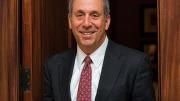“What is the best thing you’ve done as president?” It is a question I am asked frequently these days. If I were to name everything of which I am proud, everything accomplished with the help of many other people over these last five years, there would be little room to write anything else in this column. But there is one thing, above all else, that I hope persists and inspires: my advocacy and action for the benefit of international students, immigrants, and refugees.
Those born outside of the United States have made and continue to make extraordinary contributions not only to Harvard but also to the nation. Our university would not be what it is today without them. It is why I went to bat for our Palestinian first-year student who was turned away at the border when he tried to get to Harvard. It is why I have supported the Scholars at Risk Program and advocated in Washington for our DACA students and for immigration reform more broadly. It is why, in 2020, I thought Harvard should fight to keep international students in this country when the US Immigration and Customs Enforcement sought to expel them if their college or university switched to online instruction. This cruel and reckless directive was set to disrupt the lives of more than a million students during the pandemic. Harvard, together with MIT, led a nationwide effort to see it overturned.
We sued, and we won. In a little more than a week, the government rescinded the directive. It was among my most satisfying days as president. I thought, of course, of the many Harvard students who breathed sighs of relief and of the million other foreign students who were relieved of the fear that they might no longer be welcome in this country. But I also thought about my mother, Ruth Wertheim, and about her own efforts at the age of 18 to find a way to get to this country. After surviving Auschwitz, she tried to leave Germany through France but, like our first-year student, was turned away at the border. Without alternatives, she returned despondently to her hometown, the sole survivor among her family—and the sole survivor of the Jews of Londorf.
My mother later wrote of this experience, “I never felt so alone and thought that God and the whole world had abandoned me.” Eventually, she made it to the United States on the second Liberty ship that brought refugees from Europe. She settled with an aunt and uncle who were lucky enough to escape Germany before the Holocaust. She lived with them in Michigan, where she met my father, raised her family, and lived, as improbable as it sounds, without bitterness. Because she survived, I have the privilege of writing this column. Someday, when I have the chance to reflect on my presidency, I will know that one of my proudest moments was inspired by my mother’s difficult journey to the United States.
In September, I traveled back to my mother’s hometown to participate in the dedication of a memorial recognizing the transport of the Jews of Londorf to the concentration camps on September 14, 1942. Surrounded by my family, I spoke on behalf of the descendants of the only survivor. I asked those gathered to consider not just what six million people might have accomplished if they had lived, but also what their descendants might have contributed to the world. It is one thing to recognize the dead, I said, one thing to place a plaque in their memory, but it is quite another to speak up for the living and to raise a moral voice in response to bigotry, hatred, and injustice. I challenged my audience to do good deeds, or mitzvot in Hebrew, and to give voice to those whose voices have been silenced.
Now, I challenge you to do the same and to do your part, whatever it may be, to seek out those who feel alone and abandoned, to do what is right even when it is very hard. The world—and Harvard—expect us to do no less.
Sincerely,
Lawrence S. Bacow
President









